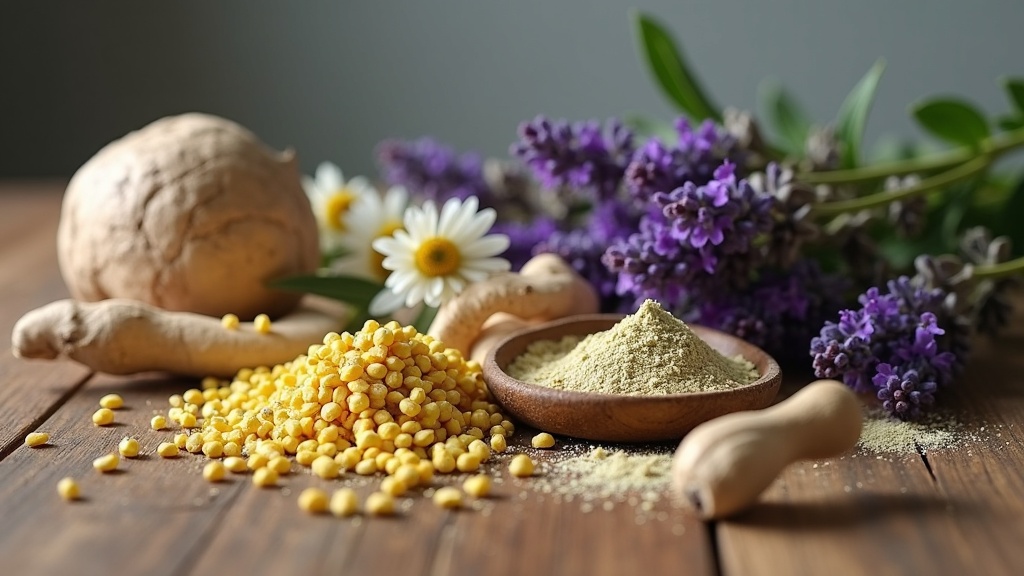 Struggling to fall asleep or stay asleep can make daytime life feel like an uphill battle. I’ve always been interested in natural remedies, especially when it comes to getting better sleep. Herbal supplements can be pretty handy for tackling sleepless nights in a gentler way than prescription meds. Here’s a closer look at the natural sleep aids I trust the most, plus some tips for getting the most out of them.
Struggling to fall asleep or stay asleep can make daytime life feel like an uphill battle. I’ve always been interested in natural remedies, especially when it comes to getting better sleep. Herbal supplements can be pretty handy for tackling sleepless nights in a gentler way than prescription meds. Here’s a closer look at the natural sleep aids I trust the most, plus some tips for getting the most out of them.
If you’re curious about herbs for sleep, you’re definitely not alone. I noticed a big difference in my own routine after making a few smart changes and trying some of these plantbased helpers. Research is still catching up with tradition in a lot of cases, but there’s solid science behind a few popular choices.
Why So Many People Are Looking for Natural Sleep Solutions
Poor sleep affects so much more than just how tired I feel. Brain fog, low mood, and even a weak immune system all trace back to those restless nights. Everyone I know who’s tried pharmaceutical options, including myself, has run into worries about next-day grogginess or dependency. That’s where herbal sleep aids, which are usually way gentler, start looking a lot more appealing.
The most common reasons people turn to natural sleep support:
- They want to avoid harsh medication side effects.
- They’re hoping for solutions they can use long term.
- They like having control over what goes into their bodies.
- They’re dealing with lowlevel insomnia, not a diagnosed sleep disorder.
Herbal supplements don’t guarantee a miracle overnight, but they can seriously help people who just need to take a bit of the edge off, calm anxiety, or fall asleep more easily. Unlike some medicines, these plantbased solutions are less likely to leave you feeling groggy or dependent at sunrise.
Top Herbal Supplements That Actually Help With Sleep
Here are the herbal remedies I see recommended most often, backed up by real user experiences and a growing pile of research. Not all herbs work the same for everyone, so it helps to know what each one brings to the table and how they might fit into your lifestyle.
- Valerian Root: Known as one of the sleep champions in the herbal world, valerian root has a long track record for helping with both anxiety and insomnia. This root seems to boost GABA activity in the brain, and GABA helps your nervous system chill out. Studies show that regular use of 300-600mg valerian root, about half an hour before bed, may help you fall asleep faster and improve sleep depth. My experience is that it’s subtle at first, but gets more effective after a week or two. The earthy flavor may take a little getting used to, but the calming benefits are worth it.
- Magnesium (technically a mineral, but often included with herbal regimens): Magnesium helps relax muscles and nerves, and most people I know have no idea they’re actually low in this mineral. Magnesium glycinate and citrate are gentle forms that absorb well. Research suggests around 200-400mg of magnesium before bed can help with insomnia, especially in older adults or anyone under a lot of stress. If you struggle with restless legs or muscle cramps at night, boosting magnesium can really pay off.
- Passionflower: I’ve tried passionflower tea for those nights when my brain won’t turn off. It has mild sedative effects thanks to flavonoids that also interact with GABA. Some studies show it improves overall sleep quality and reduces the number of times people wake up at night. You can get it as a tea, tincture, or supplement, and it works best for stressrelated sleep issues. If you like floral teas, passionflower is a soothing addition before bed.
- Lemon Balm: Lemon balm gets less attention, but I think it’s really underrated. This member of the mint family helps ease tension and restlessness, and can be especially calming for “busy brain” insomnia. It’s often paired with valerian or passionflower for extra effect. It also has a gentle, slightly citrusy taste that’s great in tea blends or tinctures.
- Lavender: Lavender isn’t just a nice scent, there’s evidence that oral lavender supplements and aromatherapy both have calming benefits. A couple of drops of lavender oil on my pillow, or a mild tea made from dried lavender, can take the edge off anxiety that keeps me up. Studies point to improved sleep quality and lower anxiety with regular use, and some people use capsules (usually 80-160mg). Lavender oil can also be added to a bath as part of a relaxing bedtime ritual.
- Chamomile: Chamomile is the classic bedtime tea for a reason. It contains apigenin, which binds to receptors in the brain that help trigger sleepiness. While results are mixed in studies, many people (myself included) find it brings a sense of calm, especially if consumed about 30 minutes before getting in bed. A warm cup of chamomile can be part of a winding-down ritual that tells your brain it’s time for rest.
- Ashwagandha: Ashwagandha isn’t a sedative, but it can help with stress that keeps people awake. Adaptogens like ashwagandha may lower cortisol (the stress hormone). I add it into my routine when life’s extra hectic, and it seems to help my sleep feel more restored. Some people take it in powder form, others use capsules—just be sure to check product quality standards.
Tips for Getting the Best Results With Herbal Sleep Aids
- Start with the lowest suggested dose on the label. You can always add a bit more if needed later on.
- Consistency matters. Herbal supplements work best when taken regularly for a couple of weeks.
- If you’re combining different herbs, pick formulas known to be safe together, like passionflower and valerian.
- Make sure your supplement comes from a reputable source. I always check for thirdparty testing to avoid unwanted additives.
- Keep a sleep diary for a few weeks so you can spot which supplements give you the best results and note any side effects.
Not all sleep problems are the same. If you keep struggling despite trying herbal remedies, it’s a good idea to talk to your doctor. Sudden or severe insomnia or other symptoms could be a sign of something more serious. Herbal sleep aids are best suited for mild to moderate trouble falling asleep or staying relaxed at night.
How Herbal Supplements Fit Into a Healthy Sleep Routine
Good sleep isn’t just about what you take, it’s about what you do. I’ve noticed the best results with herbal supplements when I combine them with basic sleep hygiene steps:
- Keep a consistent bedtime and wakeup time, even on weekends.
- Avoid screens and blue light at least 30 minutes before bed.
- Make the bedroom cool, quiet, and as dark as possible.
- Use relaxing rituals like a hot shower, gentle stretching, or a few minutes of reading.
- Skip caffeine late in the day, and limit alcohol before bed.
- Fill your evenings with relaxing activities and keep intense workouts earlier in the day, so your body is ready to settle down at night.
Supplements work as a gentle nudge, but everyday routines do a lot of the heavy lifting for better sleep. Building a sleepfriendly environment and winding-down rituals makes it more likely these natural aids will give you what you need.
Safety and Side Notes
Most herbal sleep aids are considered very safe for shortterm use, but not every option is right for everyone. Herbal ingredients can interact with prescription meds, especially antidepressants, antianxiety meds, and blood thinners. Always check with a healthcare provider before adding anything new to your routine if you’re on medication, pregnant, or breastfeeding.
It’s also smart to keep track of how you feel, especially in the first weeks of trying something new. If you notice any side effects or don’t see improvement after a month, it may be time to mix things up or check in with a professional. Listen to your body and adjust your approach as needed for the best results.
Natural Sleep Aids: Worth Trying When You Want A Restful Night
- Herbal supplements can make a real difference for people who want a little extra help relaxing into sleep.
- Look for highquality products and start with a simple formula before mixing different herbs.
- Pairing these remedies with other sleepfriendly habits stacks the odds in your favor for waking up refreshed.
- Talk to a healthcare pro if you have ongoing sleep problems or take other medications.
I’ve found that even simple changes, like a cup of chamomile or a couple of drops of lavender oil, can help calm my mind at bedtime. It’s all about finding what works for your body and your routine. Give yourself time to experiment and see how these natural solutions can support your best rest. With a little patience and curiosity, stumbling upon the right sleep strategy can make each night a lot easier to handle.
